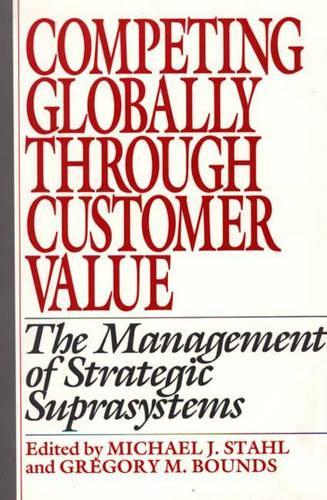
Competing Globally Through Customer Value: The Management of Strategic Suprasystems
(Hardback)
Publishing Details
Competing Globally Through Customer Value: The Management of Strategic Suprasystems
By (Author) Gregory M. Bounds
By (author) Michael J. Stahl
Bloomsbury Publishing PLC
Praeger Publishers Inc
30th March 1991
United States
Classifications
Tertiary Education
Non Fiction
International business
658.4012
Physical Properties
Hardback
848
Description
As more countries experience growing political freedoms and gravitate toward market-based economies, as Europe becomes further integrated, as Japan targets new industries, worldwide competition should become even stronger. As global competition intensifies, business must develop new ways of managing and competing. Those firms that do not, may not survive the global economic competitions of the 1990s. The answer the contributors give in this book to the questions "why should management practices change" and "how is change implemented" is embodied in the phrase "customer value". The central focus of management, they argue, should be the determination, creation, enhancement and delivery of best net value to the customer. In their view, customers do not care about the firm's profitability, quarterly earnings per share, the firm's stock price or how much the firm shipped last month. They do care that a company has taken into account their concerns of quality, cost and response/delivery time of products/services. The company sees evidence of customer appreciation through the residuals of higher market share and profitability, as well as no longer having to worry about the competition. The second major theme of the book is a natural outgrowth of the central theme: management must continuously improve strategic suprasystems which focus upon discovering, creating, improving and delivering value to the customer. A strategic suprasystem is the collection of resources and activities which are crucial to producing and delivering customer value. Such new roles for managerial-leaders are the backbone of a new managerial paradigm, a paradigm made more accessible by the inclusion in the book of several case studies of companies engaged in competition through customer value.
Reviews
"Editors Michael Stahl and Greg Bounds have produced a valuable and much needed book."- David T. Kearns Chairman Xerox Corporation
"This book should make an important contribution to helping business and other leaders understand how to use Total Quality principles to dramatically improve their results."-John Pepper President Procter & Gamble Company
"Today's customer-driven markets require business to rethink its mission, sharpen its focus on delivering customer satisfaction, and exert new leadership toward pride in workmanship. Successful business managers recognize this fact. They understand that every task from product conception and design to delivery and service must be carried out with customer satisfaction as the first priority. Satisfied customers equate to a strong competitive position."-Melvin R. Goodes President and Chief Operating Officer Warner-Lambert Company
Stahl and Bounds, the editors of this collection on strategic management, attempt to explain how American businesses can compete more effectively in the global marketplace. Stressing the importance of focusing on the customer, not the competition, the editors emphasize the need to maximize "net customer value"--what the customer receives minus what the customer sacrifices. As set forth in the 34 articles that constitute the book, companies must, in effect, shift from a classical view of management activities (planning, organizing, directing, controlling) to one that groups activities around producing systems to better serve the customer. Given the collection's emphasis on management theory--the development of an alternative management model--and its scholarly approach to the subject, it is best suited for graduate students and faculty.-Choice
"Stahl and Bounds, the editors of this collection on strategic management, attempt to explain how American businesses can compete more effectively in the global marketplace. Stressing the importance of focusing on the customer, not the competition, the editors emphasize the need to maximize "net customer value"--what the customer receives minus what the customer sacrifices. As set forth in the 34 articles that constitute the book, companies must, in effect, shift from a classical view of management activities (planning, organizing, directing, controlling) to one that groups activities around producing systems to better serve the customer. Given the collection's emphasis on management theory--the development of an alternative management model--and its scholarly approach to the subject, it is best suited for graduate students and faculty."-Choice
Author Bio
MICHAEL J. STAHL is Associate Dean for Research and External Affairs in the College of Business Administration at the University of Tennessee, Knoxville. His past experience includes professorships at two other universities, and the position of Program Manager for the design and development of a communications satellite at the Space and Missile Systems Organization, Los Angeles, California. GREGORY M. BOUNDS is a Faculty Research Associate at the Management Development Center at the University of Tennessee, Knoxville. His work history includes branch office manager in the federal government, sales team manager in the advertising industry, and program analyst.
